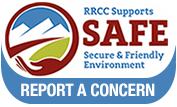Mission & Goals of the PA Program
Mission
The mission of the RRCC PA Program is to prepare physician assistants to serve all communities by practicing professional, empathetic, inclusive, team-based medicine with a focus on primary care and an emphasis on excellence.
Goals
The goals of the RRCC PA program are to:
- Train and graduate competent PAs
The success of the program in meeting this goal is demonstrated through:
a. A first-time PANCE pass rate comparable to the national average based upon cohort size equivalency
|
|
1st time PANCE pass rate 2023 |
Cohort size |
Failures per cohort |
|
RRCC |
97% |
31 |
1 |
|
National data per NCCPA |
92% |
45 (average) |
3.6 |
b. A graduation rate of greater than 90%
- In 2023, the RRCC graduation rate was 97%
2. Promote the development of professionalism and professional identity
The success of the program in meeting this goal is demonstrated through:
a. Content and advising designed to teach, monitor, and promote professionalism
- Content and assessment in program courses
- Facutly, preceptor, and community partner panel presentations and Q&A sessions
- Advising forms evaluating professionalism
- Preceptor evaluations assessing professionalism
- In 2023, no student attrition occurred due to professionalism alone
b. Produce graduates with professionalism appropriate for the workplace
- In 2023, all graduates passed required professionalism expectations
- Post-graduation survey of class of 2023, 97% of respondents(30 of 31) indicated that the program prepared them for professionalism aspects of healthcare in the workplace.
3. Deliver a primary care-focused*, team-based curriculum
The success of the program in meeting this goal is demonstrated through:
a. Curriculum content taught by organ system with a primary-care focus
- Annual Program review of curriculum
b. Providing clinical experiences in primary care to include populations across the lifespan
- Annual Program review of clinical curriculum and ongoing student patient logs
c. A goal of 50% of graduates with an interest in practicing in primary care
- In 2023, 87% of graduates displayed an interest in accepting a job in primary care
* Health services that cover a range of prevention, wellness, and treatment for illnesses seen across the lifespan
4. Emphasize the underserved/rural practice of medicine
The success of the program in meeting this goal is demonstrated through:
a. Delivering content and assessment that examines the challenges and opportunities in underserved/rural medical practice
- Content in program courses- Professional Seminar courses and Advanced Practice Seminar
b. Providing at least two underserved and/or rural clinical experiences per student
- Met each year with generally up to 4 underserved/rural experiences per student
- In 2022, the program received funding for a rural immersion grant providing extend learning opportunities. Twelve students from the class of 2023 completed the immersion track.
c. A goal of 30% of graduates with an interest in rural medicine
- In 2023, 81% of graduates displayed an interest in accepting a job in a rural community upon graduation.
5. Serve the community
The success of the program in meeting this goal is demonstrated through:
a. Providing community service opportunities
- Sites such as Community Table and Patterson Elementary health fair
b. Service to the community as a student portfolio requirement
- Service-learning synopsis to be included in final portfolio for graduation
- 100% of graduates in 2023 met the goal of 6 hours of community service.
6. Foster a climate of belonging
The success of the program meeting this goal is demonstrated through:
a. Discouraging cohort competition
b. Faculty availability to all students
c. Provide an opportunity for students to have a graduate mentor of a similar background as a support through the program
d. RRCC resources including affinity groups, Office of Inclusion and Diversity, counseling services, Veteran's support, and Accessibility Services
- The success of meeting this goal is demonstrated through an annual Program self-assessment of these aspects
- In 2023, 90% of the graduates felt a sense of belonging










